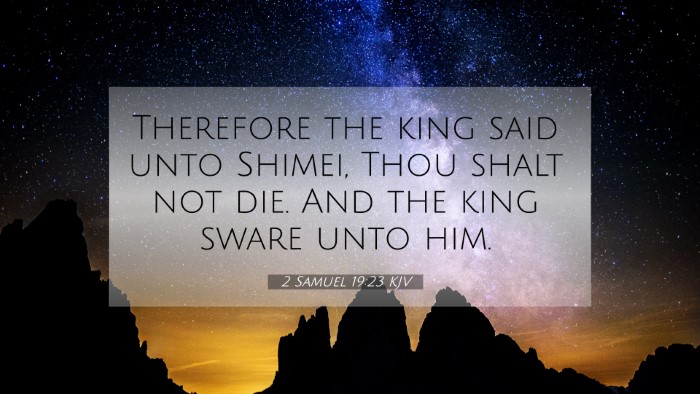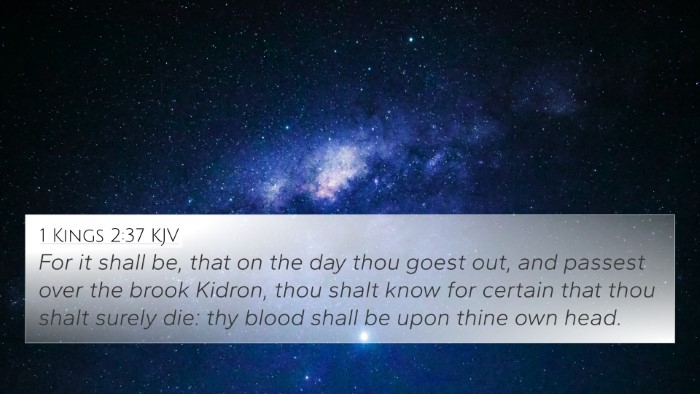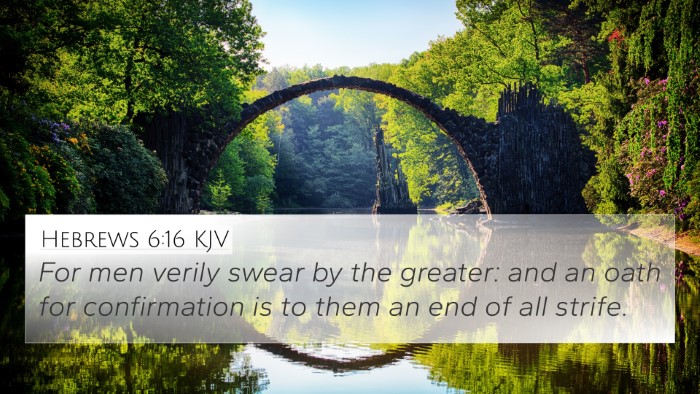Understanding 2 Samuel 19:23
Verse: "And the king said unto Shimei, Thou shalt not die. And the king sware unto him." (2 Samuel 19:23)
Summary of the Verse
This part of the scripture reflects a moment of mercy and grace extended by King David towards Shimei, who previously had cursed David during his flight from Absalom. This decision reveals themes of forgiveness and the complexities of leadership.
Commentary Insights
Various public domain commentaries provide profound insights into this verse, highlighting its theological and practical applications.
-
Matthew Henry's Commentary:
Henry emphasizes the mercy shown by David, illustrating how rulers are often faced with the dilemma of justice versus mercy. David's promise to Shimei signifies a shift from vengeance to reconciliation, which is vital in leadership.
-
Albert Barnes' Notes:
Barnes notes that David's swearing not to execute Shimei stands as a testament to God's providence and the importance of showing grace, reflecting the heart of a leader who desires healing over conflict.
-
Adam Clarke's Commentary:
Clarke provides a historical angle, mentioning that Shimei’s actions were significantly severe at the time, which makes David’s mercy more poignant. Clarke indicates that this incident shows how individuals can be preserved through grace, even after grave sins.
Thematic Connections
The themes found within this verse can be connected to various other biblical passages, illustrating God's mercy, forgiveness, and the dynamics of power. Below are some Bible verse cross-references that relate to 2 Samuel 19:23:
- Matthew 6:14-15: "For if you forgive others their trespasses, your heavenly Father will also forgive you, but if you do not forgive others their trespasses, neither will your Father forgive your trespasses."
- Luke 6:36: "Be merciful, even as your Father is merciful."
- Romans 12:19: "Beloved, never avenge yourselves, but leave it to the wrath of God, for it is written, 'Vengeance is mine, I will repay, says the Lord.'
- Ephesians 4:32: "Be kind to one another, tenderhearted, forgiving one another, as God in Christ forgave you."
- James 2:13: "For judgment is without mercy to one who has shown no mercy. Mercy triumphs over judgment."
- 1 Peter 3:9: "Do not repay evil for evil or reviling for reviling, but on the contrary, bless, for to this you were called, that you may obtain a blessing."
- Micah 7:18: "Who is a God like you, pardoning iniquity and passing over transgression for the remnant of his inheritance? He does not retain his anger forever, because he delights in steadfast love."
Applications for Today's Believers
The implications of this verse extend into the life of modern believers. It emphasizes the importance of forgiveness and the power of mercy. In a world filled with strife and retribution, this passage serves as a reminder to choose grace, reflecting God's character in our interactions.
Conclusion
In conclusion, 2 Samuel 19:23 provides rich insights into the nature of forgiveness and leadership. It encourages believers to seek restoration and to act with mercy. The connections to other scriptures enhance the understanding of this theologically significant moment in David's life and its applications today.








